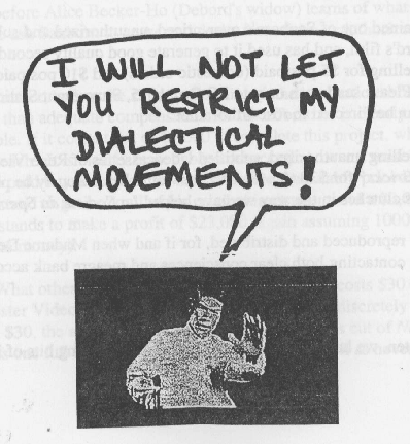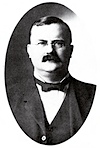One of the most promising cultural spaces in Morocco languishes in a limbo
Read it here
Tag: culture
A Century of Arab Art, Compressed Into a Book: @ursulind’s review in @alfanar of a new and fascinating entry in @MuseumModernArt Primary Documents series
Read it here
The No. 1 Sun Engine

The 11th Cairo International Biennale kicks off in a few days, and while I’ll unfortunately miss the opening I will be back in a few weeks to check out this intriguing project I was emailed about. The No. 1 Sun Engine was operational in Maadi, a posh southern suburb of Cairo, in 1913 and was among the first serious experiments in solar power. Its American inventor, Frank Shuman, raised funds to deploy the bizarre contraption (which works by powering a low-pressure steam turbine) in London before visiting sun-drenched Cairo to build it. Its first use in to power a water-pump for irrigation with water from the Nile.
You can read more about the history of the sun engine at project page, where there’s a timeline that tracks Shuman’s movements alongside with prominent historical events, such as Lord Kitchener’s arrival in Cairo and the start of World War I. The juxtaposition of this early venture into solar power and major geopolitical developments is fascinating, if only because WWI ushered in the era of oil (and the systematic sabotage of alternative energy projects), while Shuman developed his machine because he (as a Pennsylvanian) was worried about reaching the exhaustion of then-recoveroble coal, the Victorian age’s equivalent of peak oil. Of course, coal (control of which was a key objective of WWI and which is now undergoing a revival in China and the US among others) powered the war effort and shaped European societies, notably by making industrialization possible, much as after WWI control of oil (and specifically Middle Eastern oil) would help make possible massive social change and an unprecedented age of plenty in America.
I’ve always found this interconnection of social organization, imperialism and technology fascinating – such as in some of the recent work of Tim Mitchell, who has looked at the differences in social organization of coal and oil-based societies (because of the distribution model for each resource) and their role in making Western democracy possible (and therefore also perhaps impossible in other conditions). In this respect I highly recommend his short article n the subject (to my knowledge the only one available), which is in Word format here: Tim Mitchell’s article on carbon democracy
But I’ll go see this exhibition for the sheer cool steampunk aspect of it.
Kulturkampf
Chronicles of a Refugee

Chronicles of a Refugee is a 6-part documentary film series looking at the global Palestinian refugee experience over the last 60 years. Through the voices of Palestinian refugees, the first three episodes recount the experiences of Palestinian refugees since 1947. They are more historical and informative, presenting an almost comprehensive review of 60 years of dispossession. Continue reading Chronicles of a Refugee
At the Townhouse Gallery

LAPDOGS OF THE BOURGEOISIE
Featuring the artists
Annika Eriksson
Chris Evans
Dirk Fleischmann / Michele di Menna
San Keller
Hassan Khan
Natascha Sadr Haghighian
Marion von Osten.Curated by Nav Haq and Tirdad Zolghadr
To what extent does class play a role in the production and dissemination of contemporary art? Lapdogs of the Bourgeoisie is a project touring internationally from 2006 to 2009, investigating how and whether the ideology of socioeconomic background still defines your artworld career, and to which point such a career might consolidate the ideologies in question. In short, the notion of class is the thematic touchstone of the project, and yet the idea is not to use contemporary art to explore class structures in society at large. Rather, the project hopes to develop a sense of art world reflexivity, tracing hegemonic patterns within the field itself.
I thought this was funny. I hope it was intended that way. More details here.
Rocking the cradle: Grateful Dead in Egypt, 1978

I am not a Deadhead, but having no idea until today that the Grateful Dead played at the Pyramids in 1978, I would love to see this new DVD (click on the album cover above to see the Amazon details):
Much has been written about this storied adventure: About the band’s long-standing desire to play in “places of power,” as Phil put it years ago… The incredible logistical gymnastics necessary to get permission for this strangest of American rock bands to bring their peculiar alchemy to the cradle of the ancient world… The huge, scattered caravan of crazies that descended on Cairo from the U.S. and Europe, drawn to the desert by some irresistible force… The sheer magnitude of shipping in tons of sound equipment, setting up in 110-degree heat, maxing out the local power grid, trying to turn the King’s Chamber in the Great Pyramid into an echo chamber (alas, Osiris would have none of that!)… The wondrous interplay at each of the three concerts between Nubian drummers and singers and the Grateful Dead… The miraculous final show, during a total lunar eclipse… The synchronicity of that last show and the signing of a peace treaty between Egypt and Israel… Magical horse and camel rides under the desert moon…Trips up and down the Nile… High adventure at every turn!
Now that sounds like fun.
On the New York Subway
It’s a long ride from Coney Island to Williamsburg, where I’m staying. The girl knocks over her bottle. She gets aggressive with another passenger. She boy spends most of his time trying to calm her down, nuzzling in closer, making her giggle. But she seems to enjoy getting riled up–this long drunken ride, with someone paying attention her, with the whole compartment pretending not to listen and look, might be just her idea of fun. When I’m only a few stations away from my destination, I hear her say something about “getting back into the military.” “I wanna go shoot some sand-niggers,” she says. “That’s what we call ’em. That’s what I like to do. Shoot me some sand niggers. Over in … Baghdad. In…uh…Pakistan! ‘Cause I hate those people over there.” The boy tries to shush her a little, but that only makes her keep going, louder–daring anyone to react. She says it over and over again–this young drunk American girl, with her hot pants and her obvious troubles–how she can’t wait to go shoot “sand niggers.”
(Completely unrelated P.S.: I took a bit of a hiatus with the Arabist Review, but am back to posting now).
Arabic versions of Harry Potter, Pinnochio, banned in Zionistan
Israel cracks down on Arabic Harry Potter
1 hour, 51 minutes ago
JERUSALEM (AFP) – Harry Potter and Pinocchio are apparently not welcome in Israel, at least in their Arabic translations imported from Syria and Lebanon.Arab-Israeli publisher Salah Abassi told Israeli public radio on Monday that authorities ordered him to stop importing Arabic-language children’s books from the two longtime foes of Israel.
The ban includes translations of such books as Pinocchio and Harry Potter as well as Arabic classics.
“The trade and industry ministry and treasury warned me that importing those books is illegal,” said Abassi, who imported the books through Jordan.
The ban is based on a decree from 1939 — when the area was under British mandate — prohibiting the importation of books from countries that are at war with Israel.
Abassi told the Maariv daily most of the books can be found only in Lebanon and Syria.
“If they were printed in Jordan or Egypt, which are friendly to Israel, I would lose no time in buying them there. Now the significance is that the Arabic reading public in Israel will not be able to enjoy the best literature,” he said.
Hmmm, if this ban is based on a law dating back from mandate Palestine, how can it have anything to do with Israel? Surely Israel does not recognize the laws in place before its creation? AFP should clarify this point.
Market Islam
I ended up writing on a phenomenon that has interested me for a while, every since I read Patrick Haenni’s great book “L’Islam de Marché” (“Market Islam”), which I think unfortunately has never been translated into English: Islamic “branding” and Islamic consumer lifestyles. I also got to use one of my own all-time favourite interview anecdotes: the time a young Islamic TV preacher quoted Brian Adams to be to explain the concept of submission to Allah.
The post just skims the surface of what is a complex and interesting subject. (And this should go without saying, but my discussion of the intersection of capitalism and Islam is not meant as a critique of the Muslim faith).
